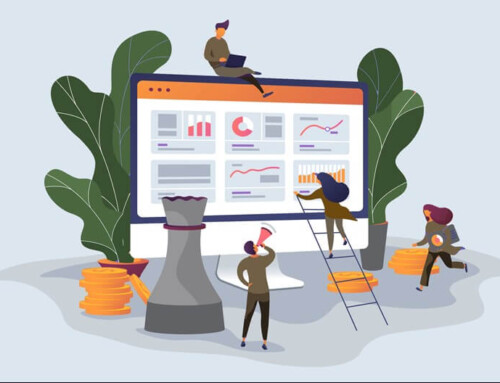If you work in business-to-business (B2B) sales, chances are good that you have used, or at least encountered some form of artificial intelligence (AI) while doing your job. For example, you have used a search engine, have a social media profile, experienced a chatbot, utilized a Customer Relationship Management (CRM) system, or have a mobile device with an AI-driven or AI-enhanced app.
Since so many B2B prospects conduct their own research online before speaking with a salesperson, AI has earned its rightful place in the sales funnel. This technology is not just beneficial for organizations who are seeking products or services. It also offers many benefits to companies who want to win their business.
- 64% of B2B marketers consider AI a valuable asset to their marketing and sales strategies. (1)
- A Harvard Business Review study found that companies that incorporated artificial intelligence into their sales and marketing saw an increase in lead generation by more than 50%, and overall cost reductions of up to 40% to 60% (2)
- 61% of executives operating with an innovation strategy believe AI has identified opportunities within their data that would otherwise have been overlooked. (3)
Due to its potential, 95% of companies are prioritizing the investment into sales technology and almost 65% are already using AI in some form. (4)
That said, artificial intelligence must be leveraged in a thoughtful, deliberate manner. Mastering AI technology the right way is key to reaping its benefits. This article touches on the benefits, the drawbacks, and the areas of B2B sales where AI shines.
WAYS THAT AI GETS AN A+ FOR B2B SALES
Chatbots and Customer Support
Chatbots are virtually everywhere these days — on websites, e-commerce shopping sites, social media platforms and apps for mobile devices. This technology holds a conversation with visitors.
How can a non-human entity do this? Chatbots respond to visitors based on a set of pre-programmed prompts. For example, a chatbot may help direct web visitors to find solutions to frequently asked sales, support or billing questions. They also learn more responses to more prompts the longer they are in use.
Well-programmed AI-driven bots enhance customer experience, resolve customer issues promptly and provide around-the-clock support (5). This frees up time for your teams to focus on higher-priority tasks while AI handles repetitive and mundane tasks.
Additionally, chatbots can mitigate customer service issues before they become problematic. The technology is sophisticated enough to track customer activity. For example, if AI detects a higher volume than usual on a question or complaint, it can send a notification to your team so they can investigate the matter promptly and resolve it.
Predictive Analytics
Years ago, the adage of sales held that it was a numbers game. The theory was that more leads in the pipeline translated to higher sales conversions somewhere in the future. However, this is no longer the case since companies today seek high efficiency and productivity.
Having a full pipeline is not valuable if the leads are not both qualified and quantified. This is an area where AI offers benefits. The technology:
- Can quickly vet and score volumes of data to identify which prospects are most likely to result in a sale.
- Analyze the value these leads are likely to give the organization.
How does AI do this? It uses data to predict future customer behavior and trends. (4)
Personalization
Digital marketing offered insights into actions and behaviors to refine messages and campaigns. However, salespeople cannot act if the data is delayed, not interpreted or is interpreted incorrectly.
AI applies data on lead preferences and behavior to create content tailored to these characteristics. (4) The more personalized the messages your sales team sends prospects and in real-time, the better the odds are of earning their business.
Customer Segmentation
Traditional segmentation methods encountered challenges that were limited to industry, size, location or specific behaviors. With the introduction of AI, customer segmentation is faster, real-time, scalable, and less prone to errors.
Better yet, AI can rapidly analyze vast amounts of data and detect patterns, trends and preferences to identify segments. Using this data, AI segments customers based on various factors, enables targeted messaging, and tailors messaging to each segment. (6) This helps improve segmentation with known variables, but also can identify emerging, new or unknown segments.
Content Optimization
Search engines and social media are essential to online marketing. The goal of optimizing content is to be seen by a wider audience, and ideally, get them to engage with it. Using AI-powered tools such as machine learning and natural language processing (NLP), AI measures the relevance and quality of content. AI helps optimize content for better search engine visibility and relevance, increasing website traffic and engagement (6).
It can be used to help brainstorm new content ideas such as headlines, captions, summaries or articles based on keywords or topics. Of course, these ideas should be used as inspiration only, to prevent issues with copyright infringement.
AI also has the ability to define audience behavior — determining what content they like, what platforms or channels they engage with most, and defining places where promoting your content is most likely to yield the desired results.
Lead Generation and Scoring
AI can review historical data from past and present customers looking for familiar patterns, behaviors and trends. This data can then be used in social media and other platforms to find prospective customers who act, sound, and talk like your ideal customers. This can significantly augment primary audience and human-defined audiences to target for lead generation, resulting in more lead opportunities.
Then once leads are uncovered, AI-powered tools score leads by analyzing data. (7) The characteristics of high-value leads are defined with scoring criteria such as demographic matches, engagement specifics, time spent interacting, and buying intent signals. Each criterion is given a score and assigned a priority according to that score. When a new lead enters the system, it is assigned a score based on its criteria. This score may also change with personalization and nurturing campaigns. A higher score defines a valuable lead which signals a higher priority for sales teams. High-score alerts can be established to notify sales teams when a lead has met certain criteria and the conditions are ideal for quality sales outreach to take place.
Sales Forecasting
One of the most common issues with sales forecasting is inaccuracies caused by human error and bias. This can happen for several reasons.
- Complex sales cycles – Business-to-business sales cycles are typically lengthy and involve multiple decision makers.
- Alignment issues – Internal departments that fail to work in sync can cause issues ranging from incomplete projects to costly errors.
- Human bias – A sales representative who overestimates positive outcomes can influence optimistic predictions that do not come to fruition.
- Relationship bias – A sales representative who relies too heavily on established relationships and makes assumptions about behaviors or limits growth.
- Overreliance on historical patterns – Assuming that old patterns will continue repeatedly can lead to behaviors that might let prospects slip away.
- Not anticipating the unknown – Unforeseen and unexpected events impact sales.
- Market conditions – No market is one hundred percent certain and stable. There will always be changes that impact sales.
- Competition – Competitors constantly evolve and change, and these changes can impact the market drastically.
- Data quality – Inaccurate data does not represent the current picture and poses risks to accurate forecasting.
AI-powered tools can analyze data from a variety of different sources (and departments) to get a more accurate and whole picture. By playing this role, the technology assists in more accurate sales forecasting (5).
AREAS OF IMPROVEMENT FOR AI IN B2B SALES
Accuracy
As good as AI has become at functions like personalizing sales communications, inaccuracies do occur. ChatGPT is a perfect example. Shortcomings of this particular machine learning model include a store of knowledge that ends two years shy of the current year.
Additionally, you need to be aware of, and try to avoid, AI hallucinations. (False information which appears factual but is not). This may result in having to:
- Ask shorter, more direct questions.
- Add context to clarify what you really need.
- Refine your results.
Input
One culprit of AI missteps is incorrect inputs or a lack of data. In other words, the people who trained it failed to do their due diligence. Machine learning models literally reap what their trainers sow.
The best defense against this potentially disastrous scenario is a solid offense. Make sure the people training your machine learning models are paying careful attention to accuracy and testing the responses rigorously.
A STRONG USE CASE FOR AI IN B2B BUSINESS
Even with the drawbacks, there is still a strong use case for leveraging AI in B2B sales. At the end of the day, AI is not going anywhere. It will only become more widely used with time.
Businesses that embrace this reality and keep up with the curve or make the bold decision to get ahead of it, will position themselves for long-term success. AI will never replace the essential value of people, but it can make the work people do that much better.
Are you seeking a more productive and effective sales team? Contact Gavel International to learn more about our group incentive travel planning services.
_______________________
SOURCE(S):
1 https://www.zoominfo.com/solutions/operations
2 https://hbr.org/2016/06/why-salespeople-need-to-develop-machine-intelligence
3 https://www.globenewswire.com/news-release/2016/07/20/1187793/0/en/62-of-Organizations-Will-Be-Using-Artificial-Intelligence-AI-Technologies-by-2018.html
4 https://diginomica.com/using-ai-help-sales-teams-be-more-effective-their-workflow
5 https://www.mckinsey.com/capabilities/growth-marketing-and-sales/our-insights/ai-powered-marketing-and-sales-reach-new-heights-with-generative-ai
6 https://www.sciencedirect.com/science/article/pii/S0268401220308082
7 https://influencermarketinghub.com/ai-marketing-tools/
This article was last updated on September 19, 2023
- 7 Time Saving Offsite Meeting Planning Techniques - July 21, 2025
- AI-Powered Team Building for Modern Meeting Planners - July 7, 2025
- Best Ways to Experience the Culture, History and Charm of Marbella, Spain - June 16, 2025






